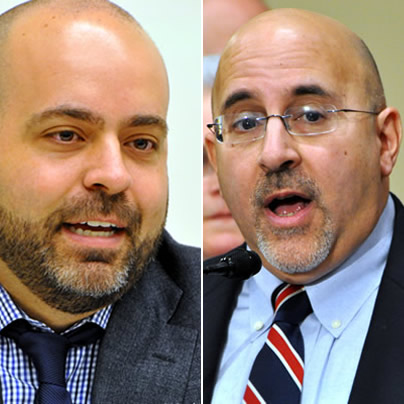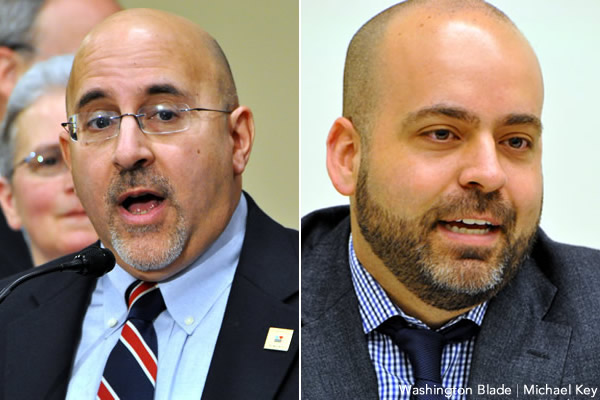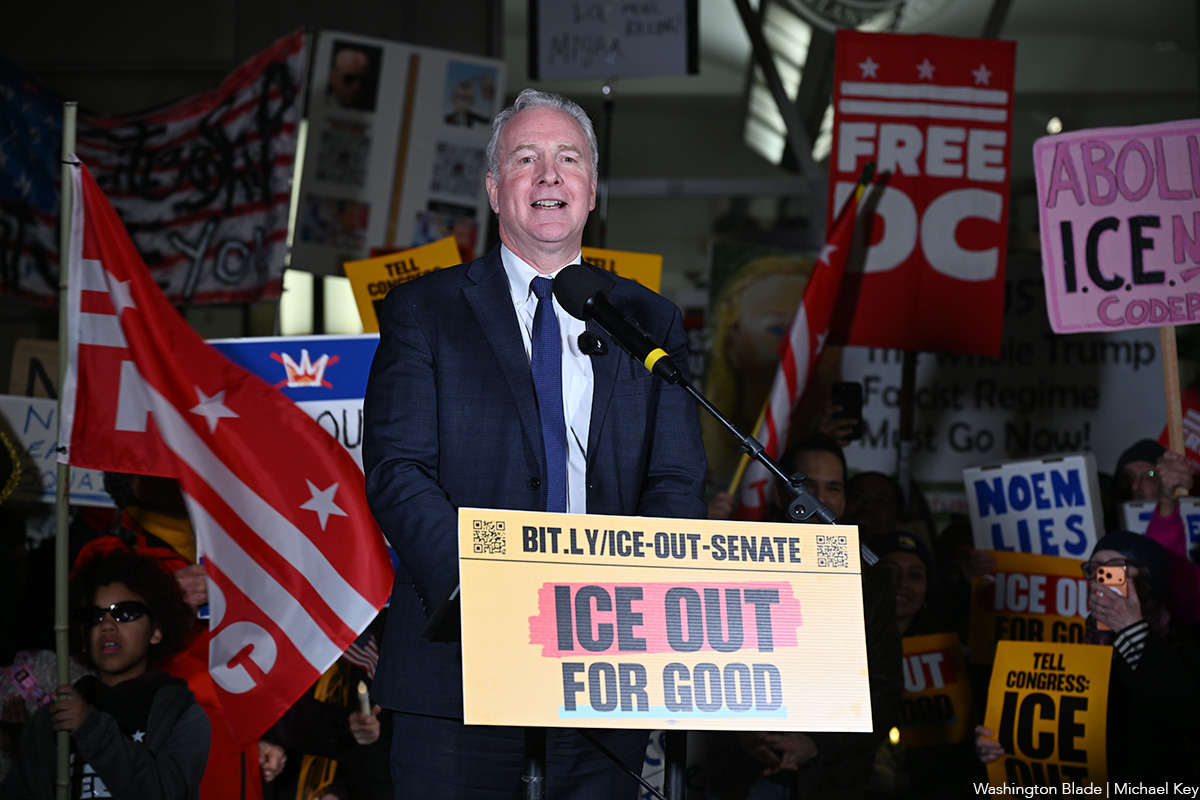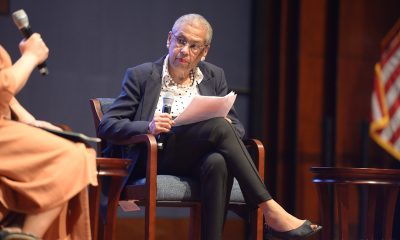Politics
Religious exemption inspires heated debate at ENDA panel
Wolfson challenges current language in LGBT anti-discrimation bill


Freedom to Marry’s Evan Wolfson (left) and Freedom to Work’s Tico Almeida had heated exchange on ENDA’s religious exemption (Blade file photos by Michael Key).
NEW YORK — The appropriate scope of the religious exemption in the Employment Non-Discrimination Act continues to stir debate as a prominent marriage equality advocate on Thursday made a surprise endorsement of narrowing the broad provision in the bill.
Evan Wolfson, president of Freedom to Marry, said he shares the “grave concerns” expressed by the American Civil Liberties Union over the religious exemption — which he said would “carve coverage by certain kinds of entities for LGBT people” — during a panel as part of Freedom to Work’s premier “Situation Room” in New York City.
“I do have grave concerns about the specific language in the specific bill,” Wolfson said. “That’s one of the points of difference I have with Freedom to Work on this current bill.”
Currently, ENDA has a religious exemption that provides leeway for religious organizations, like churches or religious schools, to discriminate against LGBT employees. That same leeway isn’t found under Title VII, which prohibits religious organizations from discriminating on the basis of race, gender or national origin.
Wolfson and Tico Almeida, president of Freedom to Work and proponent of the religious exemption, were the lone speakers on the second panel of the day. Wolfson’s main purpose on the panel was to talk about the lessons the campaign to pass ENDA can learn from the marriage equality fight.
Almeida initially responded by saying the religious exemption has value in allaying concerns from Republican lawmakers who are undecided on ENDA.
“I would say that in a bunch of Republican meetings we spend a majority of the time talking about the religious exemption and exactly how it will apply, what the case law is,” Almeida said.
Almeida co-wrote the current version of the religious exemption when working as a staffer for Rep. George Miller (D-Calif.). It was passed as an amendment on the U.S. House floor in 2007 to a gay-only version of ENDA by a vote of 402-25.
But Almeida qualified his support for the religious exemption by saying he believes religious organizations shouldn’t be able to receive federal funds if they discriminate against LGBT people. But, Almeida continued, the mechanism to prohibit this discrimination isn’t ENDA; rather, it should be a workplace non-discrimination executive order signed by President Obama.
“I think there’s complete uniformity that we are all pushing for a federal policy that if you take and profit from federal dollars, you must follow American values, you must pledge not to discriminate against LGBT folks — and if you get caught, there should be consequences,” Almeida said.
But Wolfson quickly retorted as the panel developed into a heated debate between him and Almeida that seemed to become almost hostile as the session closed.
“We have a body of laws across the country that include sexual orientation and gender identity as prohibited discriminatory classifications alongside race, sex and others — and they have all followed generally a certain kind of exemption — as had Title VII and the Civil Rights Act, and so on,” Wolfson said. “The problem with this current draft of ENDA is that exemption goes far beyond what that body of experience has taught us is the right balance.”
Wolfson added the argument in favor of ENDA to undecided lawmakers should be to look at existing law throughout the states as opposed to enshrining “new and unnecessary and dangerous exemptions from non-discrimination law.”
“By the way, calling them religious exemptions implies that there’s some religious problem to be solved,” Wolfson said. “There is no religious problem to be solved: what these are are licenses to discriminate.”
Almeida, a Catholic, responded by saying he thinks attitudes should change within the church by action from members of that particular faith.
“I don’t believe civil rights statute in the form of Title VII and ENDA should be used to force the Catholic Church to make a change to its policies,” Almeida said. “I think we will push them, and it may take decades, and it may take more than my lifetime, but we will push them in other ways.”
Almeida added he doesn’t understand the argument the religious exemption in ENDA is a new approach because he said he “literally copied and pasted it from Title VII.”
Besides, Almeida also said groups that oppose ENDA’s religious exemption missed an opportunity to propose an amendment when the Senate Health, Education, Labor & Pensions Committee voted on the bill in July. Also, he challenged them to make public the language they would prefer instead.
“I would love for those organizations to publicly communicate to the LGBT community and to Congress what is their proposal,” Almeida said. “They made a big fuss …, and they didn’t seek an amendment at markup. They didn’t ask any of our progressive champions, and there are very progressive champions on that committee, or if they asked, then they got rejected.”
Wolfson countered by saying Almeida’s proposal to change the Catholic Church from within is “completely irrelevant” to the conversation of putting a “license to discriminate” in a statute.
“Nobody is saying that the Catholic Church should be sued or told what to do as a matter of law when it comes to doctrine or the church, or ministers,” Wolfson said. “That’s misleading language that might confuse people in a way that you didn’t intend.”
Additionally, Wolfson said Almeida was mischaracterizing the religious exemption in ENDA by saying it’s lifted from Title VII. Almeida conceded that point on the panel.
“To say that something has some degree of religion in it, but now that it’s in the marketplace, it can now fire not just the priest, but the janitor, that’s an exemption that doesn’t exist in Title VII or any other parts of law,” Wolfson said.
Concluding his argument, Wolfson said the religious exemption issue must be resolved because it’s giving fuel to the anti-LGBT forces seeking to thwart ENDA passage.
“The religious exemption language thing is mostly a distraction, it’s a non-and-wrong solution to a non-problem, but becomes important if it get put into law,” Wolfson said.
Ian Thompson, legislative representative for the ACLU, told the Blade after the panel he commends Wolfson for endorsing a narrower religious exemption for ENDA, calling the news “a great development.”
“As a leader of the freedom to marry movement, he knows as well as anyone the importance of rejecting overly broad religious exemptions,” Thompson said.
Further, Thompson responded to Almeida’s claims that narrower language on religious institutions hasn’t been proposed by pointing to existing law.
“The alternative to ENDA’s unprecedented religious exemption has been and remains crystal clear,” Thompson said. “Just as our civil rights laws have never permitted blank checks to discriminate based on race, sex, national origin, age, and disability, they must not now do so based on sexual orientation and gender identity.”
Discussion of the religious exemption also came up during the first panel of the day, which consisted of six speakers from a bipartisan group of LGBT organizations. Paul Schindler, editor-in-chief of Gay City News, asked the panel if they were comfortable with the language.
Gregory Angelo, executive director of the National Log Cabin Republicans, started off the discussion by saying he was “comfortable” with the current wording because it’s hard enough selling the bill as it is.
“Without naming names, there are meetings that I have had with Republicans — both in the House and the Senate — where there’s some Republicans who don’t feel those religious protections go far enough,” Angelo said. “We’re pushing back against that. I think the protections as they exist now are strong, they’re solid.”
Melissa Sklarz, a transgender Democratic activist from Stonewall Democrats of New York City, seemed to support the exemption on a temporary basis as a way to win support for the bill, saying it won’t hold up in court and is just “a barrier to try to win allies” on the Republican side.
“It’s a good idea,” Sklarz said. “We watched them fight LGBT equality in ‘Don’t Ask, Don’t Tell’ and we’ve watched it in marriage. As they keep throwing things at ideas that prevent equality, they will not stand up. If this is going to win allies among the moderate and right-wing so we can get it to the floor, then great.”
Asked by Schindler whether under the current religious exemption he could be fired at a Catholic hospital or a Mormon book store, Almeida replied, “It depends.”
“It depends on the facts,” Almeida said. “Law has very few bright line tests, and neither the Title VII religious exemption, nor the ENDA religious exemption, list types of organizations. So, courts have created factors that are considered.”
Almeida said courts have established that for-profit businesses are eligible for the religious exemption under existing law. But he acknowledged that organizations like the Catholic Church and Catholic Charities will be able to continue to discriminate against LGBT people in hiring and firing decisions.
“By tying the ENDA religious exemption explicitly to the Title VII religious exemption, that gives us the most clarity, and as a byproduct, and for me it’s just a byproduct, it’s going to be the one to help us win,” Almeida said.
Congress
McBride, other US lawmakers travel to Denmark
Trump’s demand for Greenland’s annexation overshadowed trip

Delaware Congresswoman Sarah McBride is among the 11 members of Congress who traveled to Denmark over the past weekend amid President Donald Trump’s continued calls for the U.S. to take control of Greenland.
McBride, the first openly transgender person elected to Congress, traveled to Copenhagen, the Danish capital, with U.S. Sens. Chris Coons (D-Del.), Thom Tillis (R-N.C.), Jeanne Shaheen (D-N.H.), Dick Durbin (D-Ill.), and Lisa Murkowski (R-Alaska) and U.S. Reps. Steny Hoyer (D-Md.), Gregory Meeks (D-N.Y.), Madeleine Dean (D-Pa.), Don Bacon (R-Neb.), and Sarah Jacobs (D-Calif.). The lawmakers met with Danish Prime Minister Mette Frederiksen and Greenlandic MP Pipaluk Lynge, among others.
“I’m grateful to Sen. Coons for his leadership in bringing together a bipartisan, bicameral delegation to reaffirm our support in Congress for our NATO ally, Denmark,” said McBride in a press release that detailed the trip. “Delaware understands that our security and prosperity depend on strong partnerships rooted in mutual respect, sovereignty, and self-determination. At a time of growing global instability, this trip could not be more poignant.”
Greenland is a self-governing territory of Denmark with a population of less than 60,000 people. Trump maintains the U.S. needs to control the mineral-rich island in the Arctic Ocean between Europe and North America because of national security.
The Associated Press notes thousands of people on Saturday in Nuuk, the Greenlandic capital, protested against Trump. British Prime Minister Keir Starmer is among those who have criticized Trump over his suggestion the U.S. would impose tariffs against countries that do not support U.S. annexation of Greenland.
A poll that Sermitsiaq, a Greenlandic newspaper, and Berlingske, a Danish newspaper, commissioned last January indicates 85 percent do not want Greenland to become part of the U.S. The pro-independence Demokraatit party won parliamentary elections that took place on March 12, 2025.
“At this critical juncture for our countries, our message was clear as members of Congress: we value the U.S.-Denmark partnership, the NATO alliance, and the right of Greenlanders to self-determination,” said McBride on Sunday in a Facebook post that contained pictures of her and her fellow lawmakers meeting with their Danish and Greenlandic counterparts.
Congress
Van Hollen speaks at ‘ICE Out for Good’ protest in D.C.
ICE agent killed Renee Nicole Good in Minneapolis on Jan. 7

U.S. Sen. Chris Van Hollen (D-Md.) is among those who spoke at an “ICE Out for Good” protest that took place outside U.S. Customs and Border Protection’s headquarters in D.C. on Tuesday.
The protest took place six days after a U.S. Immigration and Customs Enforcement agent shot and killed Renee Nicole Good, a 37-year-old woman in Minneapolis.
Good left behind her wife and three children.
(Video by Michael K. Lavers)
Congress
Advocates say MTG bill threatens trans youth, families, and doctors
The “Protect Children’s Innocence” Act passed in the House

Georgia Congresswoman Marjorie Taylor Greene has a long history of targeting the transgender community as part of her political agenda. Now, after announcing her resignation from the U.S. House of Representatives, attempting to take away trans rights may be the last thing she does in her official capacity.
The proposed legislation, dubbed “Protect Children’s Innocence Act” is among the most extreme anti-trans measures to move through Congress. It would put doctors in jail for up to 10 years if they provide gender-affirming care to minors — including prescribing hormone replacement therapy to adolescents or puberty blockers to younger children. The bill also aims to halt gender-affirming surgeries for minors, though those procedures are rare.
Greene herself described the bill on X, saying if passed, “it would make it a Class C felony to trans a child under 18.”
According to KFF, a nonpartisan source for health policy research, polling, and journalism, 27 states have enacted policies limiting youth access to gender-affirming care. Roughly half of all trans youth ages 13–17 live in a state with such restrictions, and 24 states impose professional or legal penalties on health care practitioners who provide that care.
Greene has repeatedly introduced the bill since 2021, the year she entered Congress, but it failed to advance. Now, in exchange for her support for the National Defense Authorization Act, the legislation reached the House floor for the first time.
According to the 19th, U.S. Rep. Sarah McBride (D-Del.), the first trans member of Congress, rebuked Republicans on the Capitol steps Wednesday for advancing anti-trans legislation while allowing Affordable Care Act tax credits to expire — a move expected to raise health care costs for millions of Americans.
“They would rather have us focus in and debate a misunderstood and vulnerable one percent of the population, instead of focusing in on the fact that they are raiding everyone’s health care,” McBride said. “They are obsessed with trans people … they are consumed with this.”
Polling suggests the public largely opposes criminalizing gender-affirming care.
A recent survey by the Human Rights Campaign and Global Strategy Group found that 73 percent of voters in U.S. House battleground districts oppose laws that would jail doctors or parents for providing transition-related care. Additionally, 77 percent oppose forcing trans people off medically recommended medication. Nearly seven in 10 Americans said politicians are not informed enough to make decisions about medical care for trans youth.
The bill passed the House and now heads to the U.S. Senate for further consideration.
According to reporting by Erin Reed of Erin In The Morning, three Democrats — U.S. Reps. Henry Cuellar and Vicente Gonzalez of Texas and Don Davis of North Carolina — crossed party lines to vote in favor of the felony ban, joining 213 Republicans. A total of 207 Democrats voted against the bill, while three lawmakers from both parties abstained.
Advocates and lawmakers warned the bill is dangerous and unprecedented during a multi-organizational press call Tuesday. Leaders from the Human Rights Campaign and the Trevor Project joined U.S. Rep. Becca Balint (D-Vt.), Dr. Kenneth Haller, and parents of trans youth to discuss the potential impact of restrictive policies like Greene’s — particularly in contrast to President Donald Trump’s leniency toward certain criminals, with more than 1,500 pardons issued this year.
“Our MAGA GOP government has pardoned drug traffickers. They’ve pardoned people who tried to overthrow the government on January 6, but now they want to put pediatricians and parents into a jail cell for caring for their kids,” said Human Rights Campaign President Kelley Robinson. “No one asked for Marjorie Taylor Greene or Dan Crenshaw or any politician to be in their doctor’s office, and they should mind their own business.”
Balint, co-chair of the Congressional Equality Caucus, questioned why medical decisions are being made by lawmakers with no clinical expertise.
“Parents and doctors already have to worry about state laws banning care for their kids, and this bill would introduce the risk of federal criminal prosecution,” Balint said. “We’re talking about jail time. We’re talking about locking people up for basic medical care, care that is evidence-based, age-appropriate and life-saving.”
“These are decisions that should be made by doctors and parents and those kids that need this gender-affirming care, not certainly by Marjorie Taylor Greene.”
Haller, an emeritus professor of pediatrics at St. Louis University School of Medicine, described the legislation as rooted in ideology rather than medicine.
“It is not science, it is just blind ideology,” Haller said.
“The doctor tells you that as parents, as well as the doctor themselves, could be convicted of a felony and be sentenced up to 10 years in prison just for pursuing a course of action that will give your child their only chance for a happy and healthy future,” he added. “It is not in the state’s best interests, and certainly not in the interests of us, the citizens of this country, to interfere with medical decisions that people make about their own bodies and their own lives.”
Haller’s sentiment is echoed by doctors across the country.
The American Medical Association, the nation’s largest organization that represents doctors across the country in various parts of medicine has a longstanding support for gender-affirming care.
“The AMA supports public and private health insurance coverage for treatment of gender dysphoria and opposes the denial of health insurance based on sexual orientation or gender identity,” their website reads.
Rodrigo Heng-Lehtinen, senior vice president of public engagement campaigns at the Trevor Project, agreed.
“In Marjorie Taylor Greene’s bill [it] even goes so far as to criminalize and throw a parent in jail for this,” Heng-Lehtinen said. “Medical decisions should be between patients, families, and their doctors.”
Rachel Gonzalez, a parent of a transgender teen and LGBTQ advocate, said the bill would harm families trying to act in their children’s best interests.
“No politician should be in any doctor’s office or in our living room making private health care decisions — especially not Marjorie Taylor Greene,” Gonzalez said. “My daughter and no trans youth should ever be used as a political pawn.”
Other LGBTQ rights activists also condemned the legislation.
Tyler Hack, executive director of the Christopher Street Project, called the bill “an abominable attack on the transgender community.”
“Marjorie Taylor Greene’s last-ditch effort to bring her 3-times failed bill to a vote is an abominable attack on the transgender community and further cements a Congressional career defined by hate and bigotry,” they said. “We are counting down the days until she’s off Capitol Hill — but as the bill goes to the floor this week, our leaders must stand up one last time to her BS and protect the safety of queer kids and medical providers. Full stop.”
Hack added that “healthcare is a right, not a privilege” in the U.S., and this attack on trans healthcare is an attack on queer rights altogether.
“Marjorie Taylor Greene has no place in deciding what care is necessary,” Hack added. “This is another attempt to legislate trans and queer people out of existence while peddling an agenda rooted in pseudoscience and extremism.”
U.S. Rep. Mark Takano (D-Calif.), chair of the Congressional Equality Caucus, also denounced the legislation.
“This bill is the most extreme anti-transgender legislation to ever pass through the House of Representatives and a direct attack on the rights of parents to work with their children and their doctors to provide them with the medical care they need,” Takano said. “This bill is beyond cruel and its passage will forever be a stain on the institution of the United States Congress.”
The bill is unlikely to advance in the Senate, where it would need 60 votes to pass.
-

 Real Estate5 days ago
Real Estate5 days agoConvert rent check into an automatic investment, Marjorie!
-

 Theater5 days ago
Theater5 days agoSwing actor Thomas Netter covers five principal parts in ‘Clue’
-

 District of Columbia4 days ago
District of Columbia4 days agoEleanor Holmes Norton ends 2026 reelection campaign
-

 Opinions4 days ago
Opinions4 days agoICE agents murder another American citizen in Minneapolis




















